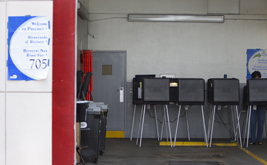
Voting Rights Icon Lawrence Guyot’s Death Animates a Fight Over the Future Voting Rights Icon Lawrence Guyot’s Death Animates a Fight Over the Future
Guyot's memorials prompted a Wall Street Journal op-ed writer to insist that the civil rights past is irrelevant to the Voting Rights Act’s future.
Dec 6, 2012 / Brentin Mock and Voting Rights Watch
Nevada Led the Country in Expanding the Vote. Now, It’s Eyeing Voter ID Nevada Led the Country in Expanding the Vote. Now, It’s Eyeing Voter ID
Nevada's Secretary of State wants to implement a costly voter ID registration system to combat nonexistent voter fraud.
Dec 3, 2012 / Aura Bogado and Voting Rights Watch
Tea Party Crowd’s Answer for Why Romney Lost? Voter Fraud! Tea Party Crowd’s Answer for Why Romney Lost? Voter Fraud!
An idea is spreading on the right that Republicans are unfairly constrained by a court ruling that bars the party from targeting “ballot security” measures at communiti...
Nov 27, 2012 / Brentin Mock and Voting Rights Watch
What Took So Long? Explaining Arizona’s Ballot Count Fiasco What Took So Long? Explaining Arizona’s Ballot Count Fiasco
Arizona is still counting ballots cast more than two weeks ago—but why did it issue so many provisional ballots to begin with?
Nov 21, 2012 / Voting Rights Watch

Voting Rights Haven’t Gotten Such Attention Since 1965. What Did We Learn? Voting Rights Haven’t Gotten Such Attention Since 1965. What Did We Learn?
Here are ten lessons from an election season in which voting itself was hotly debated.
Nov 16, 2012 / Brentin Mock and Voting Rights Watch
Why the Voting Rights Act Likely Won’t Survive Supreme Court Review Why the Voting Rights Act Likely Won’t Survive Supreme Court Review
The Voting Rights Act is, in some ways, living on borrowed time.
Nov 14, 2012 / Brentin Mock and Voting Rights Watch
Beyond Ballots: When Communities Are the Real Candidates Beyond Ballots: When Communities Are the Real Candidates
One week after Obama’s re-election, the work of social and economic justice movements is as clear as ever.
Nov 13, 2012 / Aura Bogado, Noni M. Grant, and Voting Rights Watch
Watch a Colorado GOP Poll Watcher Report a ‘High Concentration of People of Color’ Watch a Colorado GOP Poll Watcher Report a ‘High Concentration of People of Color’
A Republican poll watcher complains that too many people of color were voting in Aurora, Colorado, on Election Day.
Nov 7, 2012 / Aura Bogado and Voting Rights Watch
Undeterred by the Long, Slow Line Toward Democracy Undeterred by the Long, Slow Line Toward Democracy
Those long, snaking lines were about more than a vote. The people most battered and excluded from the nation's politics and economy refuse to be ignored.
Nov 7, 2012 / Brentin Mock and Voting Rights Watch
Voters in Predominantly Black Ohio Suburb Forced to Cast Provisional Ballots Voters in Predominantly Black Ohio Suburb Forced to Cast Provisional Ballots
A number of residents in Forest Park, a predominantly black suburb outside Cincinnati, are reporting they’re being forced to cast provisional ballots.
Nov 7, 2012 / Voting Rights Watch
